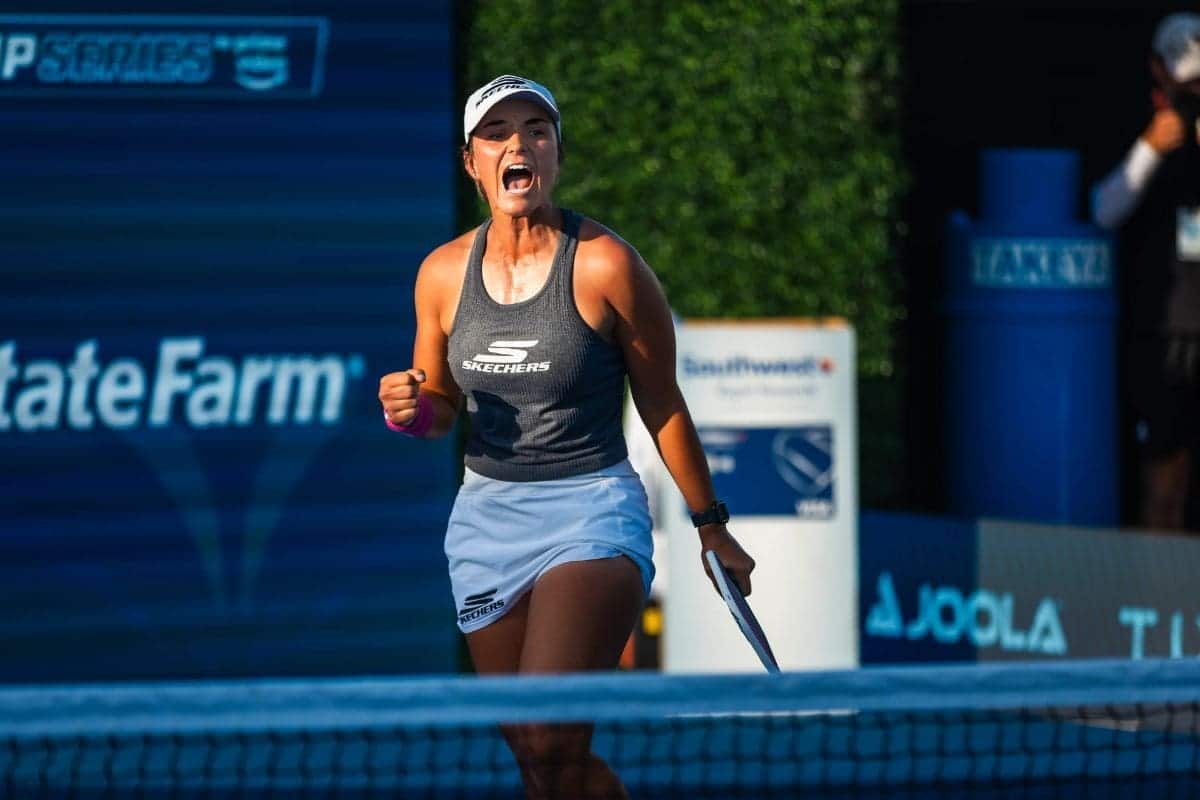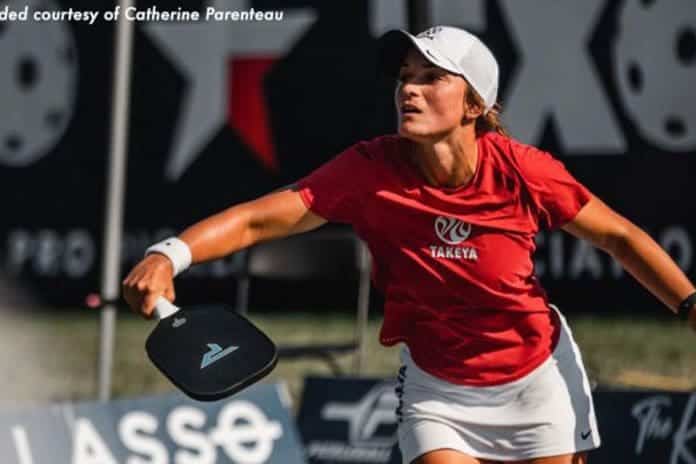Catherine Parenteau’s Mastery of Pickleball: In pickleball, mastering defensive techniques can often be the key to turning the tide in a match. When faced with a strong opponent’s well-placed dink or aggressive volley, players often find themselves pushed back from the kitchen line or forced into awkward, off-balance positions. It’s in these moments that the savvy player knows the importance of a well-executed reset or lob to regain control of the point.
Understanding the Reset Shot
A reset in pickleball is a defensive maneuver where a player delicately receives their opponent’s shot, typically a volley or drive, and softly returns the ball over the net into the kitchen. Similar to executing a third-shot drop, the reset aims to slow down the pace of play, neutralize the opponent’s aggression, and allow the player to regain a stable position on the court.
When executing a reset, focus on hitting the ball straight ahead of you and shallow over the net. This slight arc in the trajectory buys valuable time, helping you reset your position and posture for the next shot. In higher-level play, where precision is paramount, a well-placed reset can prevent vulnerabilities like the Erne shot—a daring maneuver where an opponent leaps over the kitchen to strike the ball in mid-air.
The Defensive Lob: A Strategic Alternative
Another effective defensive tactic is the lob, particularly useful when a dink is hit close to the sideline near the kitchen. Unlike the reset that returns the ball into the kitchen, the lob is aimed high over the opponent’s head and lands deep in the backcourt. To execute a successful lob, start with a low-to-high swing motion similar to a dink, but emphasize follow-through to impart additional lift on the ball.
A carefully timed lob not only provides ample time to reestablish your position at the kitchen line but also forces your opponent into a challenging retrieval position. Aim the lob straight ahead and preferably over your opponent’s non-dominant arm to minimize their chances of making a quick, aggressive return.
Practicing Defensive Skills
To hone these critical defensive skills, structured drills are essential. Start by practicing cross-court dink resets with a partner, focusing on maintaining balance and control even under pressure. Experiment with different heights and placements to understand the nuances of effective resets.
For defensive lobs, engage in drills where you simulate game scenarios with your partner, alternating between cross-court dinks and defensive lobs when off-balance. This repetitive practice builds muscle memory and confidence in executing these shots during competitive play.
By dedicating specific drilling time to mastering resets and lobs, players can enhance their overall game strategy and resilience on the court. These defensive techniques not only bolster your defensive capabilities but also add layers of tactical depth to your pickleball repertoire.
As pickleball continues to evolve as a sport known for its speed and strategy, incorporating effective resets and lobs into your game can elevate your performance and contribute to memorable matches filled with skillful exchanges and strategic maneuvers.
Mastering the art of resets and lobs in pickleball isn’t just about defensive prowess—it’s about seizing control of the game’s tempo, outsmarting opponents, and ensuring every shot counts toward securing victory on the court.

News in Brief: Catherine Parenteau’s Mastery of Pickleball
Mastering defensive techniques like resets and lobs in pickleball is crucial for controlling matches. A reset delicately returns aggressive shots to the kitchen, buying time and neutralizing opponents’ attacks. Meanwhile, a well-timed lob sends the ball high over opponents’ heads, forcing them into challenging positions. Structured drills with partners help refine these skills, enhancing game strategy and resilience. As pickleball grows in speed and strategy, these techniques add tactical depth, ensuring players can dictate play and secure victories through strategic maneuvers.
Our Readers Queries:
Ques: Who is Catherine Parenteau engaged to?
Ans: Catherine Parenteau is engaged to Athena Trouillot.
Ques: Did Catherine Parenteau play tennis?
Ans: Yes, Catherine Parenteau played tennis. She grew up in Montreal, Canada, and was introduced to tennis at the age of 4. Her passion for the sport grew significantly over the years, and her dedication to tennis enhanced her talent in the game.
ALSO READ: New Pickleball Courts Coming to Gladstone: A Game-Changing Upgrade
